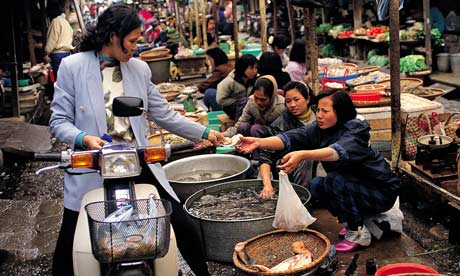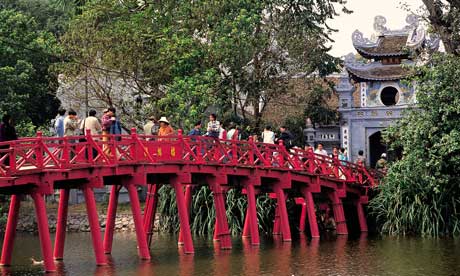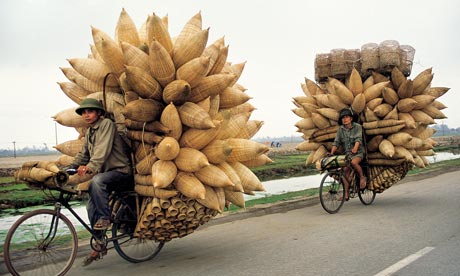Direct flights Hanoi mean you can now visit Hanoi for a long weekend (just about). Our writer takes a jet-lagged, surreal tour of Vietnam's colourful capital

Hanoi's fish market. Photograph: Alamy
The waiter was missing two fingers. The other two and his thumb were squeezed tightly around the throat of a bamboo snake, writhing and snapping and trying to relieve the waiter of one of his remaining digits.
With his other hand, he pulled a knife from his back pocket and made a delicate incision in the soft flesh of the snake's underbelly, into which he stuck his finger and ripped out its heart, plonking it into a small glass of rice wine in front of me. The wine blushed crimson.
He held the glass in front of my face. The heart was still pumping, sending little ripples through the liquid.
"Drink. Quickly," he said. "As guest, unlucky if you don't…"
I had arrived in Hanoi just a few hours earlier, having been invited on the inaugural direct flights Hanoi from the UK, which cuts many hours off the travelling time.
It had seemed the perfect opportunity to see if Hanoi could work as a long-weekend destination. After a sleepless 11-hour overnight flight, with a seven-hour time difference and feeling utterly bewildered in the fog of jet lag, it was already looking like one of my stupider ideas.
"You here just for three days," Thone, my guide, had said at the airport. "Crazy. What do you want to see?" "Everything," I'd said, which was my second mistake.
And so there I was, surrounded by Hanoi families enjoying their reptilian repasts, swallowing the still-beating heart of a snake, followed by snake intestine and kidney stir-fry, sticky rice in snake bile, and snake-head crème caramel. As I washed it all down with a bottle of rice wine containing a cobra's penis, I had a vision of animal-rights activists and environmentalists in the UK slugging it out for the right to rip my heart out.
We walked back towards downtown Hanoi on the narrow walkway across the mile-long Long Bien iron-truss bridge, high above the Song Hong, or Red River – from which the city gets its name. Hanoi means "the city in the bend of the river".
It has six million people and 6m mopeds, and it seemed like they were all out riding across the bridge, carrying just about every load imaginable, forcing us to fling ourselves against the railings to avoid decapitation by a bed frame or getting knocked over the side by a wardrobe. The never-ending tide, combined with the trains that trundled across, made the whole structure bounce and pulse as if it was alive.

Huc Bridge, which spans Hoan Kiem lake. Photograph: Hemis/Alamy
Just off the bridge, we entered the labyrinthine streets and alleyways of the Old Quarter, Hanoi's beating heart of commerce, as old as the city itself. Beneath a canopy of banyan trees dripping with Spanish moss, the pavements were full of people washing clothes, men welding metal, and makeshift barber shops. This made it necessary to walk in the road, amid the moped madness. Thone had perfected the art of negotiating the mopeds, communicating where the tide should part by wafting his hand in some divine way, like Moses.
Women in coolie hats weaved past bearing vast loads of cassavas and dried fish in baskets at either end of a flexing bamboo yoke, tiptoeing under the strain as if wearing shoes two sizes too small. If there was ever a place to feed western fantasies of the Orient, here it was.
Every street has a designated purpose, the legacy of the 13th-century guildsmen who divided up the Old Quarter into 36 areas, so the prefix "Hang" on street signs means "merchandise". We turned into Hang Ma, where the Hanoians go for their paper votive offerings to be burned on the anniversary of the death of a loved one. The votives are a reflection of their interests, so there were paper cars, stereos and life-sized bicycles.
Most shops had altars with burning incense and flowers – bought on the 1st and 15th of the Chinese lunar month for luck – at their entrance, Casablanca lilies and orchids: Vietnam is blessed with more than 1,000 varieties.
On to Hang Dong (copper bells and gongs), Hang Cot (bamboo) and Hang Non (hats). It was like the ultimate department store. On Thouc Bac (herbal medicine), the shops were crammed with lotus seeds, huge cinnamon sticks and jars of rice wine full of snakes and scorpions. The sweet smell was quite overpowering.
I was flagging now, seeing all of this as if through frosted glass. Thone took me to my hotel. I'd just dozed off when the speakers that line every Hanoi street started up, like the call of mosques, but instead of muezzin inviting the faithful to prayer, it was the government reminding citizens to pay their taxes. That stopped after an hour, after which the couple next door started having very noisy sex. At 5am the street speakers kicked off again. Then my phone rang.
"Time to go, Mike," said Thone, "no time to waste."

Weavers with conical fish baskets. Photograph: Alamy
In the grey dawn light we arrived at the Brobdingnagian vastness of Ba Dinh Square, where elderly figures exercised, flapping like butterflies in time to staccato instructions from a woman at the front. A shrill flurry of whistles, then authoritarian martial music boomed out from unseen speakers and a column of soldiers appeared, marching with furious intent in uniforms as white as virgin snow. They raised Vietnam's flag in silent reverence.
"Now you go and see Uncle Ho," said Thone, pointing to a huge colonnaded building. "He's just back from Moscow for his annual touch-up, so should be looking good."
As I shuffled in, joining a snaking queue of Vietnamese, an angry-looking soldier told me to take my hands out of my pockets, and the one 10 yards along not to hold my hands behind my back. I felt like I was going to see the headmaster, which in a way I was, because suddenly I was staring at the yellow, goateed corpse of Ho Chi Minh – Marxist-Leninist revolutionary, revered father of modern Vietnam, liberator from French colonialism, who died in 1969 – lying in his glass sarcophagus. I looked around at the Vietnamese, some wiping away tears, some staring in awe, and felt like an interloper at a moment of private grief.
In front of Ho Chi Minh's house, we walked around a carp lake shaded by mango trees, which the Vietnamese seemed to appreciate, seeing as they were all applauding it. Thone explained that Uncle Ho is said to have called the fish to be fed by clapping his hands and thus visitors now do the same. I clapped. No fish came, but a boy next to me smiled.
We stopped at a backstreet restaurant for pho bo, Hanoi's delicious staple – a salty soup of rice noodles and beef, garnished with ginger and lime and fiery chillies. We ate it with our knees up around our shoulders, sitting on the Wendy House plastic stools that every Hanoi café seems to favour, and which Thone couldn't explain.
After lunch we walked through the five courtyards of the Temple of Literature, Vietnam's first university, founded in 1076, a maze of beautiful formal gardens framed by fig trees, with low-slung pagodas with sinuous roofs. Young women in dazzling white and yellow silk ao dai dresses, embroidered with delicate silk roses and gerberas, prayed to a statue of Confucius for good exam marks.
In the middle of the city we walked around the most famous of Hanoi's many lakes, Hoan Kiem, which glittered like mercury under the sun. We weaved through games of badminton being played on makeshift courts on the pavements, the nets strung between flame trees festooned with red paper lanterns that hang like pendulous fruit.
If the morning had been full of light, the afternoon was darker. We visited the Hoa Lo prison, nicknamed the "Hanoi Hilton" by US air crew downed during their ferocious bombing of the city. One room was full of dummies of emaciated Vietnamese prisoners shackled by the French colonial authorities to their beds, the next contained the prison's grisly original iron guillotine. Then there were photographs of smiling GIs playing table tennis, which illustrated either a more benign captivity or the fact that it's the victors who write the history books.
Close by, at Dii Vet, an Aladdin's cave of a shop selling exquisite lacquerware and hand-embroidered silk tapestries, a smiling boy held up a beautiful scene of Halong Bay for me to inspect. He had seven fingers on each hand and smooth skin on the side of his face where an ear should have been. Other young people sat at looms, their fingers weaving, but staring ahead with lifeless eyes.
"Deaf and dumb," said Thone. These were some of the five million people still hereditarily affected by the Agent Orange dropped by the US. "They make these things here and send the money back to their villages."
After another sleepless night for me, Thone turned up on his moped and patted the back seat. "Now you get to see Hanoi properly!"
We flew down a street lined with coffins and a street packed with shoes, along wide boulevards flanked by giant rosewood trees, around lakes and past temples, around us continued the intricate ballet of mopeds, carrying caged parrots, or hidden under mountains of flowers so they looked like carnival floats. We passed mustard-coloured French belle-epoque mansions, the magnificent French colonial opera house, and a huge statue of Lenin, and rode along a street of restaurants where glazed dogs lay on their backs in display cases as if waiting for a tummy tickle. I felt like I had never been to such a beautiful, strange, crazy place.
On the way to the airport, Thone dropped me off at the Thang Long, a water puppet show that has its 11th-century origins in the paddy fields of the countryside and which can be best described as Punch and Judy in a pool. I watched a succession of surreal giant fish, fire-breathing dragons and mutant mushrooms do battle with villagers, accompanied by a man playing the single-string dan bau, or zither, and a woman with the most haunting voice I've ever heard.
Fourteen sleepless hours later, I would be back in my flat in London, looking at two giant water puppets and a snake's penis in a bottle of rice wine, the only proof that this was no half-remembered dream.
ve may bay eva airline
ReplyDeletebán vé máy bay đi mỹ giá rẻ
mua vé máy bay korean air
mua vé máy bay đi mỹ
mua vé máy bay đi canada
Những Chuyến Đi Cuộc Đời
Du Lich Tu Tuc
Tri Thuc Du Lich